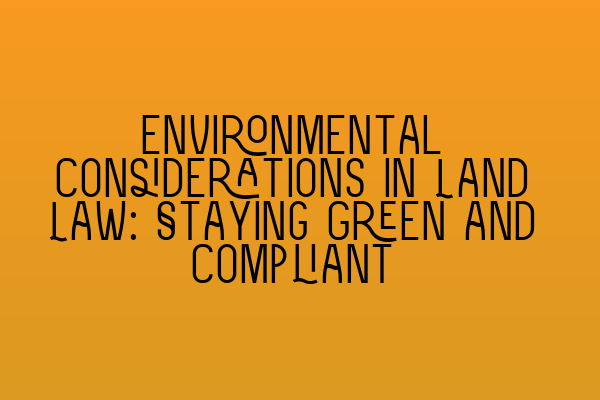Environmental Considerations in Land Law: Staying Green and Compliant
Introduction:
In recent years, the importance of environmental considerations in land law has gained significant attention. With growing concerns about climate change and the need for sustainable development, it is crucial for property law practitioners to understand and navigate the complex legal landscape when it comes to environmental compliance. This blog post will explore the key environmental considerations in land law and provide insights on how to stay green and compliant in your property transactions.
1. Environmental Due Diligence:
When dealing with land transactions, it is essential to conduct thorough environmental due diligence. This involves assessing and evaluating any potential environmental risks or liabilities associated with the property. As a solicitor practicing property law, environmental due diligence should be a priority to ensure your clients are fully aware of any environmental concerns that may affect their property interests.
2. Contaminated Land:
Contaminated land is an important environmental consideration in land law. It refers to land that has been polluted by hazardous substances, such as chemicals or industrial waste, which can pose risks to human health and the environment. It is crucial to identify and address any contaminated land issues during property transactions to avoid potential legal and financial liabilities.
3. Planning and Development:
Another crucial aspect of environmental considerations in land law is planning and development. Local planning authorities impose stringent regulations to ensure that property development projects are sustainable and eco-friendly. It is important to understand and comply with these regulations to secure planning permissions and avoid any potential legal challenges.
4. Conservation Areas and Listed Buildings:
Conservation areas and listed buildings are protected under land law to preserve their historical, architectural, and environmental significance. As a property law practitioner, you must be familiar with the regulations governing conservation areas and listed buildings to ensure compliance when dealing with properties in these designated areas.
5. Renewable Energy:
The promotion of renewable energy sources is a key component of sustainable development. Understanding the legal framework for renewable energy projects, such as solar panels or wind turbines, is essential to advise clients on the potential benefits and challenges associated with these environmentally friendly initiatives.
6. Waste Management and Recycling:
Proper waste management and recycling are integral to environmental compliance. When advising clients on property transactions, it is important to consider waste management options, such as recycling facilities or waste disposal sites. Understanding the legal requirements and regulations concerning waste management is crucial to ensure compliance and minimize environmental impact.
7. Easements and Rights of Way:
Easements and rights of way can have environmental implications, especially if they affect protected habitats or sensitive ecosystems. As a property law practitioner, it is important to consider the environmental impact of any proposed easements or rights of way and advise clients accordingly.
Conclusion:
Environmental considerations in land law cannot be ignored in today’s world. Property law practitioners play a vital role in ensuring that property transactions are not only legally sound but also environmentally responsible. By staying informed about the latest regulations and taking proactive steps to address environmental concerns, solicitors can help their clients navigate the legal complexities of land law while staying green and compliant. Investing time in understanding and incorporating sustainable practices within property transactions is not only a legal obligation but also a contribution to a greener and more sustainable future. So, let’s embrace environmental considerations in land law and make a difference!
Related Articles:
– SQE 1 Practice Exam Questions
– SQE 1 Practice Mocks FLK1 FLK2
– SQE 2 Preparation Courses
– SQE 1 Preparation Courses
– SRA SQE Exam Dates
